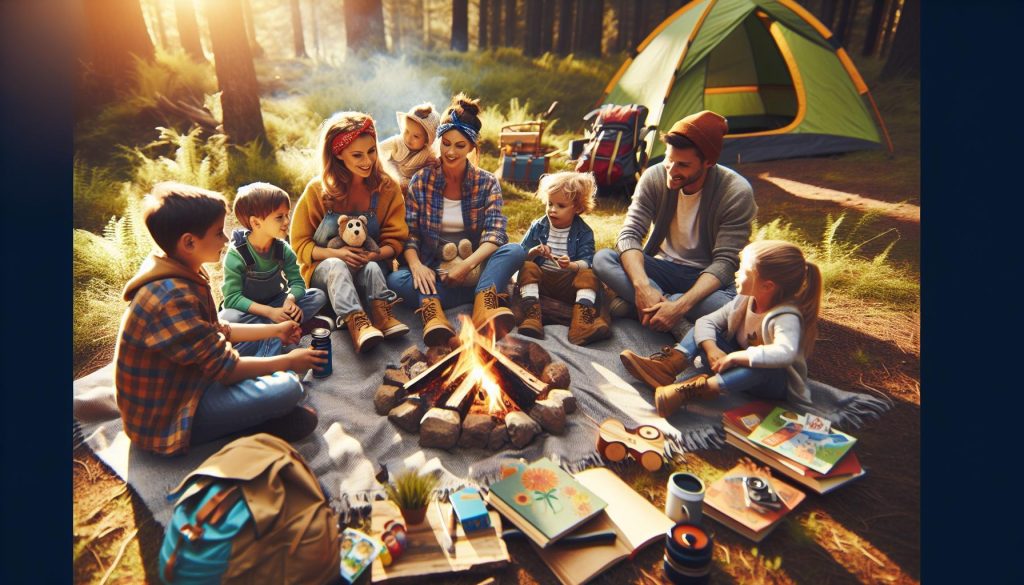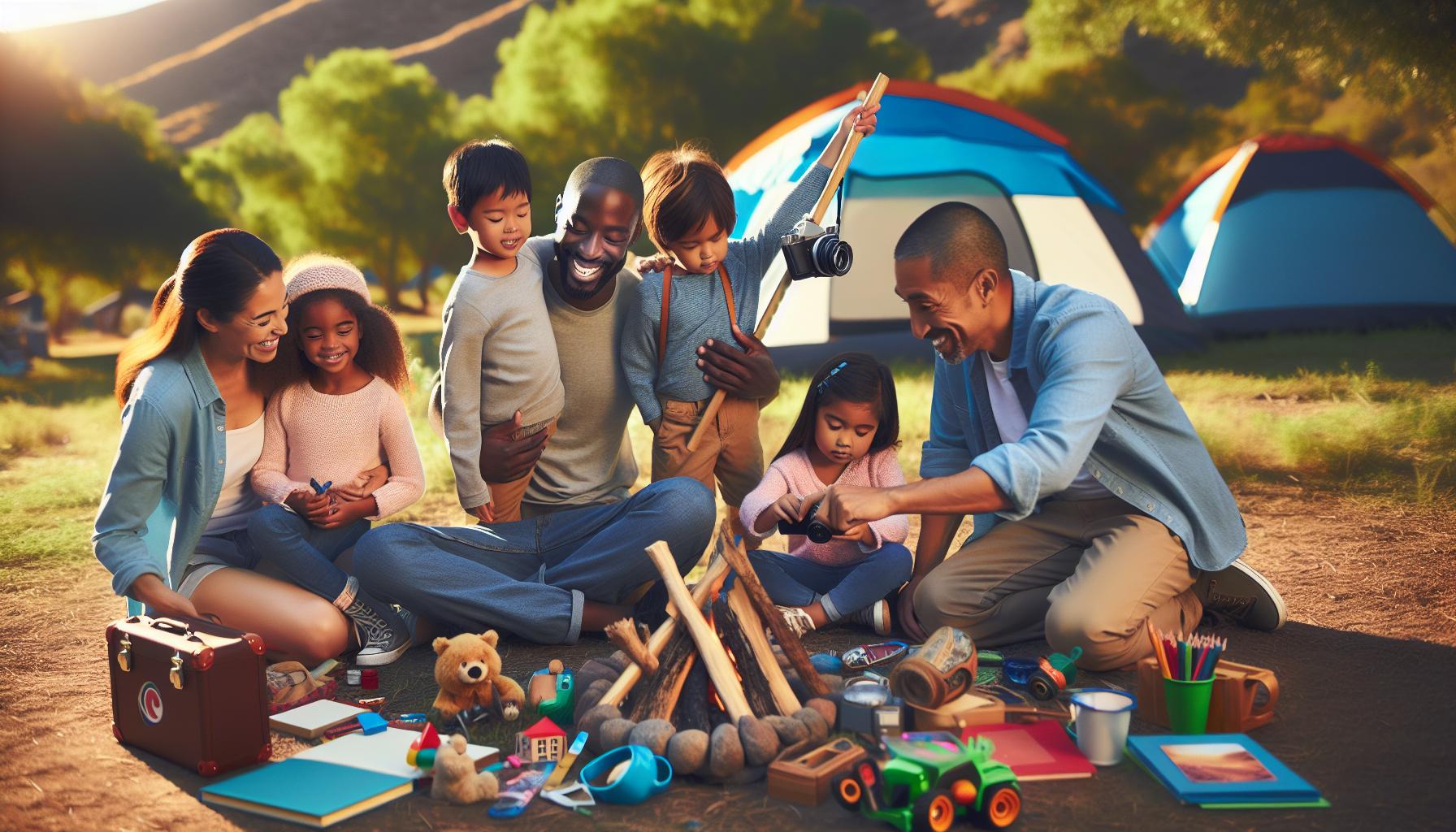Campfire Jokes for Kids to Light Up Your Next Adventure
Gather ’round the fire and prepare for a night of laughter! Looking to add some giggles to your next family camping excursion or backyard gathering? Our collection of “Campfire Jokes for Kids to Light Up Your Next Adventure” is just what you need! These kid-pleasant jokes are guaranteed to keep spirits high and smiles wide, all while making memories that will last a lifetime. Whether you’re roasting marshmallows or sharing stories under the stars, these lighthearted quips will have everyone in stitches.So, grab your s’mores and get ready to unleash a barrage of belly laughs—your adventure is about to get a whole lot funnier!
Essential Elements of a Great Campfire Joke
A memorable campfire joke can set the perfect tone for a cozy evening under the stars. Though, not just any joke will do—it requires a specific structure and style that resonates with kids and the camping spirit. Here are some essential ingredients that elevate a joke from mundane to memorable:
- Relatability: Choose jokes that kids can connect with, such as those about common camping experiences, animals, or adventures in the wilderness.
- Simplicity: The best campfire jokes are easy to understand and swift to deliver. Keep the wording straightforward so that children can grasp the punchline without confusion.
- Physical humor: Incorporate gestures or actions if appropriate.A funny stance or a silly voice can amplify the comedic effect and get everyone laughing.
- Visual aids: If possible, use props from the surroundings—a stick for a pointer, or a funny hat can add an entertaining element to the delivery.
Moreover, a good campfire joke frequently enough involves a twist or an unexpected punchline. This element of surprise can make all the difference in keeping the kids engaged. Here’s a simple table illustrating the structure of an effective joke:
| Joke Element | Purpose |
|---|---|
| Setup | Introduce a scenario or character related to camping. |
| Lead-in | Build anticipation, allowing listeners to make predictions. |
| Punchline | Deliver the unexpected twist that brings the laughter. |
don’t shy away from repetition and call-and-response techniques. Engaging the audience keeps everyone invested and enhances the overall enjoyment of the joke. A successful campfire joke creates shared laughter, builds camaraderie, and adds a sparkle to the night’s atmosphere.
Understanding Humor Development in Children
Understanding how children develop their sense of humor is a engaging journey that intertwines cognitive, social, and emotional growth. As children grow,their ability to appreciate and generate jokes evolves,reflecting their developmental stages. Early on, infants might delight in simple, silly sounds or actions, while toddlers begin to grasp the concept of surprise, which is crucial for humor. By the time they reach preschool age, many children start to enjoy simple punchlines, frequently enough reveling in the unexpected twist of a joke.
As they transition into their school years, children’s understanding of humor becomes more refined. They start to engage with wordplay, puns, and the complexities of jokes. This is also when they begin to understand the social implications of humor,using it not just as a form of amusement,but also as a tool for social bonding and communication. The ability to tell a joke offers insights into a child’s cognitive development, as it requires analytical skills and an understanding of timing and context.
Factors influencing humor development include:
- Social Interaction: Kids learn from their peers and caregivers, adapting their humor based on feedback.
- Cognitive Development: Enhanced reasoning skills contribute to grasping complex jokes.
- Emotional Intelligence: Children learn to read social cues, making their humor more relatable.
| Age | Typical Humor Styles |
|---|---|
| 0-2 years | Physical humor, silly sounds, faces |
| 3-5 years | Simple jokes, knock-knock jokes, puns |
| 6-8 years | Wordplay, more complex jokes, storytelling |
| 9+ years | Satire, irony, social commentary |
Understanding these stages not only helps parents and educators foster a child’s humor but also supports their social and emotional development. Encouraging kids to share campfire jokes can enhance their confidence, improve communication skills, and deepen bonds with friends and family through laughter. All in all,humor is a vital aspect of childhood development that shouldn’t be overlooked.
Top Categories of Campfire Jokes for Kids
When it comes to campfire jokes that keep the spirit high and the laughter rolling, there are some popular categories that kids just can’t get enough of. These categories not only ensure a good time but also bring everyone together around the fire,creating lasting memories. here are some :
- Animal Jokes: Kids love animals, and jokes about them can be both hilarious and educational. For example, “What do you call a bear with no teeth? A gummy bear!”
- Knock-Knock Jokes: The classic format is perfect for interactive fun. Encourage kids to take turns delivering knock-knock jokes; it’s a great way to involve everyone. A sample might be, “Knock, knock!” “Who’s there?” “Cow says.” “Cow says who?” “No silly, cow says moooo!”
- Puns and Wordplay: Kids enjoy playing with language, and puns are a fantastic way to do that. Try some like, “I used to be a baker, but I couldn’t make enough dough.”
- Math Jokes: Combine learning with laughter! For example,“Why was six afraid of seven? Because seven eight (ate) nine!” It’s a fun way to make math more approachable.
| Category | Example Joke |
|---|---|
| Animal Jokes | Why don’t seagulls fly over the bay? As then they’d be bagels! |
| Knock-Knock | Knock, knock! Who’s there? Lettuce. Lettuce who? Lettuce in, it’s freezing out here! |
| Puns | What do you call cheese that isn’t yours? Nacho cheese! |
| Math | What do you call a number that can’t keep still? A roamin’ numeral! |
These categories make it easy for kids to remember their favorite jokes and share them with friends and family. Always keep a few jokes ready to kick off a fun session of giggles and guffaws, turning any camping adventure into an unforgettable experience filled with joy and laughter.
Crafting Your Own Kid-Friendly Jokes
Creating your own kid-friendly jokes can be a delightful activity that brings laughter and joy around the campfire. To get started, think about what makes kids giggle. Incorporating silly scenarios, familiar characters, and simple puns can yield the most amusing results. Here are some tips to help you craft your own jokes:
- Observe Everyday Life: look at the events of the day or common situations kids encounter. For example, a trip to the zoo can inspire jests about animal antics.
- Play with Words: Incorporate puns or rhymes. For instance, “Why did the teddy bear say no to dessert? Because it was stuffed!”
- Keep It simple: ensure the jokes are easy to understand. A straightforward setup and punchline are key for keeping kids engaged.
- Include Kid-Friendly References: Use popular toys, TV shows, or games as the basis for your jokes to ensure they resonate with the audience.
Here’s a handy table of examples to inspire you:
| Setup | Punchline |
|---|---|
| Why did the bicycle fall over? | Because it was two-tired! |
| What do you call a bear with no teeth? | A gummy bear! |
| why don’t we ever tell secrets on a farm? | Because the potatoes have eyes and the corn has ears! |
Engaging kids in the joke-creating process can be especially fun.Encourage them to brainstorm ideas and play with language; together, you can craft a personalized set of jokes that make your campfire adventures even more memorable. Sharing laughter is one of the best ways to bond, and each joke can become a special memory in your kids’ hearts.
Creating a Fun and Engaging Campfire Atmosphere
To create an inviting atmosphere around the campfire, begin by focusing on the setting. Arrange seating in a circular manner, ensuring everyone has a clear view of the fire. Comfortable seating options like camping chairs, logs, or blankets help foster a cozy environment. Consider adding a few decorative touches, such as twinkling string lights or lanterns, to create a magical glow as twilight descends.
Next, consider the soundscape. The crackling of firewood is soothing, but enhancing the ambiance with background music can elevate the experience.Choose playlists with gentle acoustic tunes or nature sounds, ensuring the volume allows for conversation without overpowering it. Encourage everyone to participate in sharing stories or playful campfire jokes to engage both kids and adults, creating a lively and joyful backdrop.
In addition, the scent of the campfire can be captivating. Roasting marshmallows not only fills the air with a sweet aroma but also invites everyone to partake in the fun of preparing s’mores. Set up a dedicated snack table with various toppings and treats to keep the energy high.this interactive element invites creativity—encourage kids to come up with their own unique s’mores combinations,making it a fun activity that builds camaraderie.
have a campfire story session, where everyone takes turns sharing tales—whether spooky, funny, or adventurous. Structure the session to maintain interest; for example, establish a theme for each story that can help spark creativity. Below is a simple table with ideas for different story categories to keep things organized:
| Story Theme | Examples |
|---|---|
| adventure | Lost in the woods, treasure hunts |
| Mystery | The case of the missing marshmallows |
| Funny | silly animal antics, goofy characters |
| Folklore | Legends of the campfire |
This setup not only enhances the campfire experience but also encourages connection, laughter, and unforgettable memories for everyone involved. Your campfire will surely become the highlight of the adventure!
Tips for Delivering Jokes Effectively
When it comes to sharing jokes around the campfire, timing and delivery can make all the difference. To ensure your humor shines brightly, consider the following techniques:
- pause for Effect: A well-timed pause before the punchline builds anticipation and heightens the humor. This gives your audience a moment to engage with the setup before the twist lands.
- Use Expressions: Your facial expressions and body language can amplify the joke.Smile, raise your eyebrows, or use hand gestures to convey excitement and draw the audience in.
- Vary Your Tone: Different jokes call for different tones. A dramatic reading can enhance a silly punchline, while a deadpan delivery can elevate dark humor. Adapt your voice to match the joke’s mood.
- Engage with Your Audience: Make eye contact and interact with your listeners. Responding to their reactions or even incorporating their responses can create a fun, shared experience.
Another key aspect is to adapt your material according to your audience. Children, such as, tend to appreciate jokes that are silly and easy to understand, while a group of parents or older adults may favor more clever or observational humor. here’s a quick reference table to help you choose the right jokes for different age groups:
| Age Group | Type of Joke |
|---|---|
| Young Kids | Simple puns and knock-knock jokes |
| Older Kids | Animal jokes or light riddles |
| Teens | Sarcastic or clever one-liners |
| Adults | Observational humor and situational comedy |
Ultimately, practise is essential. Rehearsing your jokes until they roll off your tongue smoothly not only boosts your confidence but also helps you gauge the timing and nuances that resonate with your audience. Remember, the goal is to create laughter and joy, so let your personality shine through in your delivery!
Encouraging Kids to Share Their Own Jokes and Stories
not only fosters creativity but also builds confidence and enhances their social skills. When children express their humor or narrative, it opens the door for them to connect with their peers and allows everyone to engage in a fun, collaborative atmosphere. Here are some insightful ways to motivate your little ones to share their own comical tales:
- Create a Comfortable Environment: Make sure the atmosphere is relaxed, perhaps by setting up a cozy spot around the campfire with blankets and pillows.The right ambiance can make children feel safe and open to sharing.
- Lead by Example: Share your own light-hearted stories or jokes to inspire them. for instance, you might start with a simple joke like, “Why did the teddy bear say no to dessert? Because it was already stuffed!” Your lightheartedness can encourage them to follow suit.
- Encourage Group Participation: Introduce fun games that prompt storytelling. For example,play “Finish the Story” where one person starts a tale and others add a sentence. This not only enhances storytelling skills but also makes everyone feel included.
- Highlight Their Creativity: Show genuine enthusiasm when they share their jokes or stories. Celebrate their inventiveness by giving them feedback, or even having a “storytime spotlight” where they can present to the family or friends.
Additionally, consider these engaging topics or prompts to help jumpstart their creativity:
| Story Prompt | Joke Theme |
|---|---|
| A day in the life of a superhero | Animal jokes |
| What if your pet could talk? | Knock-knock jokes |
| Magical adventures in a secret land | Food-related humor |
| Funniest thing that happened at school | Science jokes |
Encouraging humor and storytelling can become a treasured bonding activity. Through laughter and imagination, kids can express themselves, while also creating lasting memories around the campfire. By nurturing these moments, you help cultivate their confidence and foster a love for sharing their unique perspectives.
FAQ
What are campfire jokes and why are they popular for kids?
Campfire jokes are short, humorous anecdotes or one-liners that kids enjoy telling around a campfire. They are typically light-hearted and family-friendly,making them perfect for social gatherings,especially during camping trips or outdoor adventures. The popularity of these jokes among children can be attributed to several factors, including their simplicity, relatability, and the communal atmosphere of storytelling around a campfire.
The experience of sitting around a campfire, sharing stories and laughter, creates a bonding moment for families and friends.The unique setting enhances the impact of humor, as the warmth from the fire and the night sky can create a cozy, inviting ambiance. Shareable stories or jokes encourage interaction among children, promoting social skills and encouraging creativity. A good campfire joke can often lead to even more jokes, stories, or playful banter, making it an engaging activity that keeps everyone entertained.
How do campfire jokes contribute to building social skills in kids?
Engaging in humor, particularly through campfire jokes, can significantly help children develop crucial social skills. When kids learn to deliver a joke, they practice several competencies, such as timing, tone, and audience awareness.Understanding how to make others laugh requires them to gauge their audience—recognizing what is funny to their friends and what might simply fall flat.
Additionally, sharing jokes fosters an environment of camaraderie and teamwork. While telling a joke, a child may be encouraged to make eye contact, use body language, and listen to friends’ reactions, all of which are significant components of effective communication. According to a study published in the Journal of Child psychology and Psychiatry, early interactions that involve play and humor can contribute significantly to emotional intelligence, which is essential for social navigation as children grow older.
What age group enjoys campfire jokes the most?
While campfire jokes can be appreciated by kids of all ages, they are particularly popular among children aged 5 to 12. This age range is significant as children are developing their sense of humor and are eager to explore language and social norms. At around the age of five, kids begin to understand simple jokes and puns, allowing them to participate enthusiastically in telling jokes to their peers and family members.
As they approach the upper end of this age spectrum, around 10 to 12 years old, their humor often becomes more complex. They start to appreciate irony, sarcasm, and situational comedy, allowing them to create or modify existing jokes, thereby fine-tuning their storytelling abilities. This capacity to adapt jokes can also be empowering for children, as it encourages creativity and individual expression. Thus, tailoring campfire jokes to fit a specific age group’s comprehension level makes them more enjoyable and impactful during a camping adventure.
Can you provide some examples of kid-friendly campfire jokes?
Absolutely! Here are a few delightful kid-friendly campfire jokes that are sure to elicit laughter from your audience:
- Why did the teddy bear say no to dessert?
Because it was already stuffed!
- What do you call a fish with no eyes?
Fsh!
- Why don’t scientists trust atoms?
Because they make up everything!
These jokes are not only simple and easy to remember but also encourage kids to think creatively about language. By using puns and playful wordplay, these jokes can stir laughter while also prompting children to invent their own variations or even create entirely new jokes inspired by these classics. Sharing such humor can lead to a playful competition among friends or family, enhancing the fun around the campfire.
how can campfire jokes enhance family bonding during outdoor adventures?
Campfire jokes serve as a natural way to foster family bonding during outdoor adventures, as they create shared experiences filled with joy and laughter. The lightheartedness of jokes encourages families to relax and enjoy each other’s company, breaking down barriers that can sometimes form between different family members, especially in larger groups. This kind of interaction is vital for creating positive memories that last, reinforcing family ties and a sense of inclusivity.
Moreover, telling campfire jokes can spark deeper conversations. As an example, a kid might tell a joke that reminds someone of a funny family moment, leading to storytelling about past adventures or shared interests. Sharing laughter and personal stories helps families to connect emotionally, enhancing understanding and affection among members. By incorporating humor into the camping experience, families can boost morale, reduce stress, and solidify their relationships, making camping trips more enjoyable and meaningful.
What tips can parents follow to encourage kids to tell campfire jokes?
To encourage kids to tell campfire jokes, parents can adopt several helpful strategies. Firstly, leading by example is crucial. parents can share their own favorite jokes or funnier stories to create a safe space for kids to join in; this modeling behavior sets the stage for children to feel comfortable sharing their own humor.
Another effective strategy is to engage children in the selection process of jokes. Consider providing them with a book or app filled with age-appropriate jokes. Encouraging them to choose a few favorites allows them to take ownership of the experience, building both their confidence and excitement to perform in front of a group. Additionally, creating a ‘joke-sharing ritual’, where everyone takes turns telling jokes sequentially, can further structure the experience and enhance participation. praise or positive reactions to their humor can reinforce their efforts, making them eager to continue sharing and exploring their comedic talents.
to sum up
As you wrap up your next outdoor adventure,don’t underestimate the power of a good joke around the campfire to enhance the experience. Not only does humor create bonding moments, but research shows that laughter can significantly boost mood and foster connections among family and friends. By incorporating kid-friendly campfire jokes into your plans, you not only provide entertainment but also encourage creativity and social interaction among children.
Remember, these light-hearted quips can serve as icebreakers, cultivate laughter, and even inspire storytelling sessions, enriching your outdoor experience. Whether it’s a classic pun or a silly riddle, the right joke at the right moment can spark joy and make memories that last a lifetime. So, gather your little campers, bring out the marshmallows, and let the laughter light up the night!




